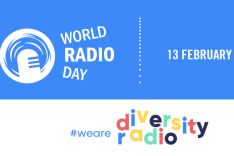Content
World Radio Day 2020

Trust through Radio
On 13 February, UNESCO celebrates ![]() World Radio Day. This year, the theme of Radio Day is ""Radio and Trust". Because despite its more than hundred-year history, radio is still one of the most widely used media, according to UNESCO: "Throughout the years, radio provided quick and affordable access to information in real time and professional coverage about matters of public interest, as well as guaranteed distance education and entertainment."
World Radio Day. This year, the theme of Radio Day is ""Radio and Trust". Because despite its more than hundred-year history, radio is still one of the most widely used media, according to UNESCO: "Throughout the years, radio provided quick and affordable access to information in real time and professional coverage about matters of public interest, as well as guaranteed distance education and entertainment."
Radio is still one of the most trusted sources of information, says UNESCO. Still, not all world citizens believe they get the information they need: "Recent world events and the Covid-19 pandemic have eroded trust in the media in general, fuelled by the circulation of false content rapidly spreading on social media," the United Nations cultural organisation states.
Media studies show that trust in the internet and social networks is declining worldwide, but trust in the news overall is increasing. And many citizens still trust radio more than any other media, says UNESCO: "This confidence level further reinforces the importance of providing citizens with accurate and reliable information whatever its costs, this being what people expect from media in current times when lives are at stake."
Still the medium with the greatest outreach
The United Nations cultural organisation therefore celebrates radio every year with good reason: no other mass medium still reaches such a broad audience. Because it is inexpensive, radio is particularly suitable for reaching remote communities and special target groups such as the illiterate, the disabled, women, young people and the poor, according to UNESCO. For all, radio offers a way to participate in public debates - regardless of individual educational or property status. In addition, radio has a special role to play in emergency communications and disaster relief, UNESCO said.
Nevertheless, according to UNESCO estimates, around one billion people worldwide still do not have access to a radio (or other media). This is one of the reasons for them to draw attention to radio with a worldwide day of action since 2012.
The aim of the World Day is to raise public and media awareness of the importance of radio, encourage decision-makers to further expand its use and accessibility, and improve international cooperation among broadcasters.
Remembering the pioneers
Why 13 February? On this day in 1946, the United Nations Radio (UN Radio) was founded. UNESCO would like to commemorate this as well as the inventors from many countries who paved the way for radio: Heinrich Hertz, Alexander Popov, Edouard Branley, Nikola Tesla, Guglielmo Marconi, Oliver Lodge, Cervera Baviera, Jagadish Chandra Bose and many others. After a long period in which the basic technology of radio remained relatively unchanged, broadcasting services are adapting in an era of media convergence, embracing new technological forms such as broadband, mobile phones, DAB+ and tablets.
Milestone patents from Tesla, Marconi and others
This year, one of the most outstanding patents in radio history celebrates its 125th anniversary: In 1897, "System of transmission of eletrcial energy" ( ![]() US645576A) was published by Nikola Tesla . The great electrical engineering pioneer was one of the pioneers of wireless signal transmission, as was Oliver Lodges ("Improvements in syntonised telegraphy without line wires",
US645576A) was published by Nikola Tesla . The great electrical engineering pioneer was one of the pioneers of wireless signal transmission, as was Oliver Lodges ("Improvements in syntonised telegraphy without line wires", ![]() GB189711575A (1,74 MB) , from 1897).
GB189711575A (1,74 MB) , from 1897).
Guglielmo Marconi became even more famous as a radio pioneer: his "Improvements in apparatus for wireless telegraphy" ( ![]() GB190007777A), registered in England on 26 April 1900, is considered a milestone in the development of radio. Marconi had already applied for other patents before, e.g.
GB190007777A), registered in England on 26 April 1900, is considered a milestone in the development of radio. Marconi had already applied for other patents before, e.g. ![]() GB189612039A (1,08 MB) (1897). In 1901, he transmitted wireless signals across the Atlantic for the first time.
GB189612039A (1,08 MB) (1897). In 1901, he transmitted wireless signals across the Atlantic for the first time.
Technically, the good old radio is still being rejuvenated today, see for example ![]() CN000113038329A or
CN000113038329A or ![]() EP 3461010A1. Patent applications at the DPMA relating to the radio recently came mainly from automotive companies (e.g.
EP 3461010A1. Patent applications at the DPMA relating to the radio recently came mainly from automotive companies (e.g. ![]() DE102012014938A1,
DE102012014938A1, ![]() DE102017203993A1) and suppliers (e.g.
DE102017203993A1) and suppliers (e.g. ![]() DE102012216824A1,
DE102012216824A1, ![]() DE102014205528A1).
DE102014205528A1).
Bilder: UNESCO, DEPATISnet
Last updated: 17 April 2025




Not only protecting innovations
Social Media